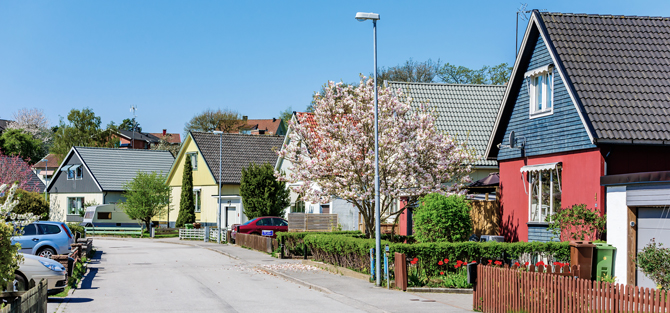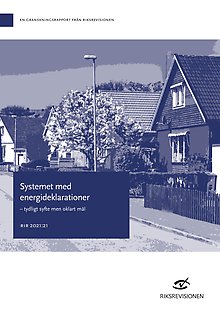Energy performance certificates for single-family houses continue to be ineffective
The energy performance certificate system was to lead to energy-efficient buildings. The Swedish National Audit Office (Swedish NAO) audit shows that it has had only minor effects on buyers‘ house choices and owners’ willingness to improve energy efficiency. However, lack of follow-up makes it impossible to see if energy consumption has been affected.

Photo: IMFOTO
Since 2009, all single-family houses sold in Sweden must have an energy performance certificate, which is ordered and paid for by the house owner. If the building’s energy performance can be improved, the energy performance certificate must also contain recommendations on cost-effective measures.
The system is based on an EU directive. In Sweden, municipal energy and climate advisory services play an important role in implementing the EU directive. The advice is mainly financed by central government with approximately SEK 80 million* per year.
The Swedish National Audit Office (Swedish NAO) has audited whether the system is designed as an effective policy instrument for energy efficiency in single-family houses. The audit shows that it has only little potential to live up to all expectations.
A majority of house buyers read the energy performance certificate, but are only marginally affected in their choice of house or willingness to improve energy efficiency. Few house buyers are familiar with municipal energy and climate advisory services.
“Almost half of the buyers state that they completely disregard the energy performance certificate when choosing to buy a specific house. The measures recommended in the energy performance certificates are rarely implemented,” says Emelie Lilliefeldt, project leader for the audit.
The audit also shows that the average number of recommended measures in the energy performance certificates has decreased since 2012, contrary to the ambitions of the Riksdag and the Government.
However, the system may have affected house prices: single-family houses in the worst energy class are sold for 10-11 per cent lower prices than houses in the best energy class – all else being equal.
“We do not have enough information to establish a causal link, but there is much to indicate that the energy classification can have a signal effect on the market and thus increase the value of single-family houses with high energy performance,” says Emelie Lilliefeldt.
The Government’s efforts in this area also have shortcomings. For example, the energy performance certificates are not coordinated with municipal energy advisory services, and there are no monitorable goals for the energy performance certificates and grants to the energy and climate advisory services.
Furthermore, there has been no follow-up since 2009 of how the system works and affects the single-family house market, or if the information submitted in the energy performance certificates is correct. Knowledge of results and effects, and how well the regulations work, is therefore non-existent.
“The Swedish NAO audited the energy performance certificates when they were introduced in 2009. Unfortunately, we must note that several of the deficiencies that were then identified are still relevant. The Government, the National Board of Housing, Building and Planning and the Swedish Energy Agency need to ensure that the energy performance certificates become more effective,” says Auditor General Helena Lindberg.
Recommendations in brief
- The Swedish NAO recommends that the Government consider tasking the National Board of Housing, Building and Planning with investigating how the energy performance certificates can be made more effective as policy instruments.
- It is recommended that the National Board of Housing, Building and Planning investigate whether the energy performance certificates give the owners of single-family houses the information intended on how energy efficiency can be implemented.
- It is recommended that the Swedish Energy Agency further systematise the follow-up of the extent to which the target groups, particularly home-owners and buyers, are accessed by and use the information for energy efficiency.
See the report for the full recommendations.
Press contact: Olle Castelius, phone: +46 8-5171 40 04.
Presskontakt: Olle Castelius , telefon: 08-5171 42 06.
Share in social media and by e-mail
Contact form
Send your questions or comments via the form below and we will make sure that they reach the right member of staff. Please state if your question concerns the information on this particular page.


